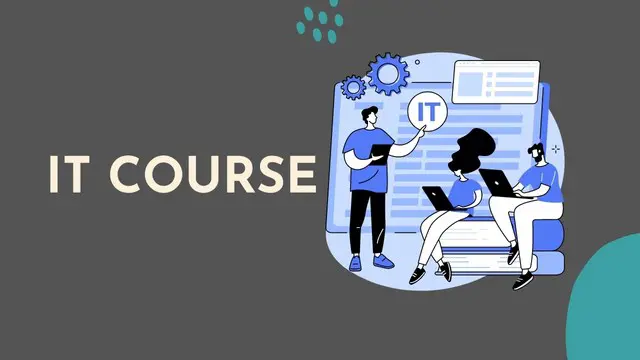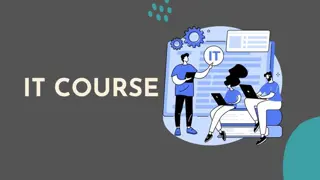
IT: Information Communication & Technology
CPD Certified| Free PDF Certificate | Lifetime Access | Learner Support | No Hidden Fees | 100% Success Rate
EDURISE
Summary
- Certificate of completion - Free
- Reed courses certificate of completion - Free
- Tutor is available to students
Add to basket or enquire
Overview
In today's digital age, Information Communication & Technology (ICT) is the backbone of businesses and organizations worldwide. This field offers vast opportunities for those seeking a dynamic and rewarding career. Here's why:
High Demand: The ICT industry is ever-evolving, with an insatiable demand for tech-savvy professionals. As businesses increasingly rely on technology, there's a constant need for skilled individuals who can keep systems running smoothly.
Diverse Roles: IT encompasses a wide range of roles, from network administrators to cybersecurity experts, data analysts to software developers. This diversity means you can tailor your career to your interests and strengths.
Business Efficiency: In today's competitive landscape, businesses that leverage technology gain a significant edge. By mastering ICT, you become an essential asset, contributing to enhanced efficiency and innovation within organizations.
Data-Driven Decision-Making: Data is at the heart of modern business. ICT professionals play a critical role in collecting, analyzing, and utilizing data to inform strategic decisions, driving businesses forward.
Competitive Salaries: IT professionals are among the highest earners in the job market. Salaries can range from £30,000 to £100,000 or more, depending on your specialization and experience.
Global Relevance: ICT skills are transferable across borders. Whether you choose to work locally or internationally, your expertise remains in high demand, offering you the flexibility to explore global opportunities.
If you're ready to embark on a journey into the world of Information Communication & Technology, you're on the path to a thriving career in one of the most dynamic and impactful industries of our time. Enroll in our course today and gain the skills needed to excel in this data-driven, tech-driven world.
Free Gift
- Course Completion PDF Certificate on IT (IT Training)
- Tutor Support with this IT (IT Training) course
- Free Session with professionals for this IT (IT Training) course.
Certificates
Certificate of completion
Digital certificate - Included
Reed courses certificate of completion
Digital certificate - Included
Will be downloadable when all lectures have been completed
Curriculum
Course media
Description
Learning Outcomes:
Upon completing this course, students will be able to:
Computer Proficiency: Develop a foundational understanding of computers, including their architecture, hardware components, and software interfaces, to confidently navigate the digital landscape.
Computer Maintenance: Acquire the skills to perform basic computer maintenance tasks and safeguard against common computer viruses, ensuring the longevity and reliability of your digital devices.
Internet and IT Literacy: Gain knowledge of internet essentials and information technology, enabling effective online communication, research, and collaboration in a connected world.
Cybersecurity Awareness: Develop a strong awareness of cybersecurity principles and practices, equipping you to protect your digital identity and data from online threats.
Certificate of Completion: Receive a Certificate of Completion, recognizing your successful mastery of fundamental computer concepts and essential IT skills.
Module 1: Getting Started with Computers
In this introductory module, you'll embark on your journey into the world of computers. Explore the basics of computer usage, from turning it on to navigating the desktop environment. Learn how to perform essential tasks and lay the foundation for more advanced concepts.
Module 2: Computer Architecture
Module 2 delves into the heart of computers by examining their architecture. Gain insights into the inner workings of a computer, including the central processing unit (CPU), memory, and storage. Understand how these components collaborate to execute commands and store data.
Module 3: Hardware
Module 3 focuses on the physical components of computers. Explore the various hardware devices that enhance computer functionality, such as input and output peripherals. Develop an understanding of how these devices connect and interact with the computer system.
Module 4: Interface and Software
Module 4 explores the interface and software aspect of computing. Learn how to interact with computer applications and the operating system. Discover essential software types and their roles in performing specific tasks, from word processing to graphic design.
Module 5: Computer Maintenance and Viruses
In Module 5, you'll dive into computer maintenance and security. Discover how to keep your computer running smoothly by performing routine maintenance tasks. Learn about common computer viruses and acquire strategies to protect your system from malware and security threats.
Module 6: Internet and IT
Module 6 introduces you to the world of the internet and information technology. Explore the basics of internet connectivity, web browsing, and online communication tools. Understand the transformative impact of IT on modern life and business.
Module 7: Cyber Security
In the final module, you'll focus on cybersecurity, a critical aspect of the digital age. Learn about the importance of safeguarding your online presence and data. Explore essential practices to protect yourself from cyber threats and secure your digital identity.
After completing the IT (IT Training) diploma course, you will be able to obtain your free PDF certificate of course completion.
Who is this course for?
Ideal Audience for This Course:
Digital Novices: Individuals who are new to the world of computers and technology, and who seek to build a solid foundation in computer literacy.
Computer Enthusiasts: Hobbyists and individuals interested in computers and technology who want to deepen their understanding of computer architecture, hardware, and software.
Home Users: Everyday computer users, including parents, seniors, and individuals who primarily use computers for personal tasks, such as emailing, web browsing, and document processing.
Small Business Owners and Entrepreneurs: Owners of small businesses looking to better manage their digital assets and understand the fundamentals of computer maintenance and cybersecurity.
Non-Technical Professionals: Professionals in non-technical roles, such as marketing, finance, or administration, who want to enhance their computer literacy to be more effective in their jobs.
Seniors: Older individuals who are new to computers or want to enhance their digital skills for communication, information access, and staying connected with family and friends.
Parents and Caregivers: Parents and caregivers who want to ensure a safe and secure digital environment for their children or dependents.
Job Seekers: Individuals seeking employment who need to improve their basic computer skills to increase their job prospects.
Tech-Curious Seniors: Seniors interested in embracing technology to enrich their lives, from online shopping and entertainment to digital communication.
Digital Safety Enthusiasts: Individuals concerned about online safety and privacy who wish to learn how to protect themselves from cyber threats.
Understanding the target audience is essential for effective marketing of this course, ensuring that it reaches individuals who can benefit from the foundational computer knowledge it offers.
Requirements
This IT (Information Technology) Diploma is suitable for
- Students interested to learn about IT (Information Technology)
- Recent graduates
- Job Seekers ( IT (Information Technology) Support Assistant)
- Anyone interested to know about IT (Information Technology)
Career path
- IT: Information Communication & Technology: £25,000 - £35,000
- IT: Information Communication & Technology + Specialization: £35,000 - £50,000
- IT: Information Communication & Technology + Expertise: £50,000 - £80,000
Note: Salary may vary based on location, employer, and additional qualifications.
Questions and answers
i want to start this course
Answer:Hi, there. Thank you for your message. Yes sure. You can start this course. Good Luck to you.
This was helpful.I am interested how can I start the course
Answer:Hi Samba, Good Day! Thank you for your query. To get started with the course you need to purchase the course. The course is designed for those who wants to have their career on IT professional, IT Technical Expert, IT Systems Administrator, IT Office Admin Assistant, IT Systems Integration Analyst, IT security specialist. After enrol you can make progress with accomplishing all the modules one after another. We welcome you to our IT course. Thanks EDURISE
This was helpful.
Reviews
Currently there are no reviews for this course. Be the first to leave a review.
Legal information
This course is advertised on reed.co.uk by the Course Provider, whose terms and conditions apply. Purchases are made directly from the Course Provider, and as such, content and materials are supplied by the Course Provider directly. Reed is acting as agent and not reseller in relation to this course. Reed's only responsibility is to facilitate your payment for the course. It is your responsibility to review and agree to the Course Provider's terms and conditions and satisfy yourself as to the suitability of the course you intend to purchase. Reed will not have any responsibility for the content of the course and/or associated materials.


